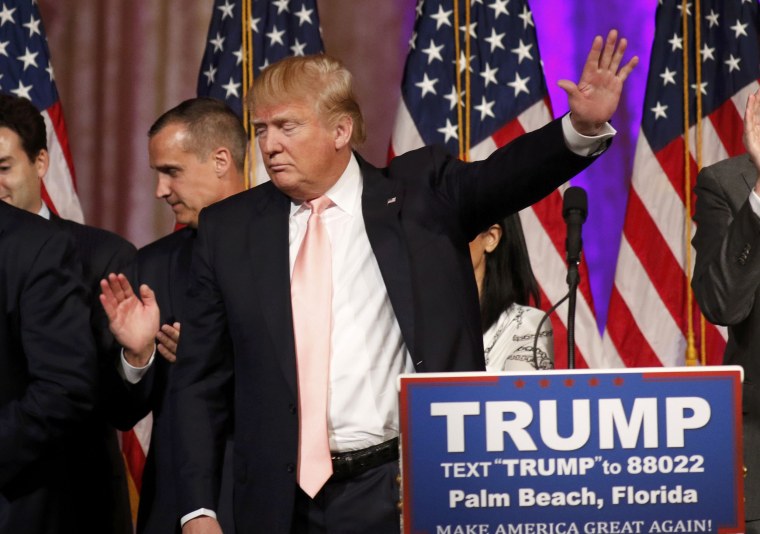After a week filled with headlines and images that may have sunk other candidates, Donald Trump surged forward as the front-runner for the Republican presidential nomination, winning four of the five states voting Tuesday night, including a big victory in Florida that pushed Marco Rubio out of the race altogether.
His big night came on the heels of a series of unsettling stories for Trump: his campaign manager was accused of assaulting a reporter; a white Trump supporter was caught on camera sucker-punching a black protester, spurring a debate over whether Trump was inciting violence and intentionally trying to widen the country’s racial divide; a planned event in Chicago was canceled because of tensions between his supporters and opponents; and the candidate himself both refused to take any responsibility for the atmosphere at his rallies and also suggested he would pay the puncher’s legal fees.
On the eve of Tuesday's votes, House Speaker Paul Ryan and Sen. Majority Leader Mitch McConnell, the two top Republicans in Washington, were forced to take the unprecedented step of urging their party’s front-runner to avoid encouraging violence at his events.
Yet Tuesday’s results suggest that GOP voters’ views of Trump are largely entrenched. The real estate mogul won the states and voting blocs he was expected to, while a sizable wing of the party continued to try to stop him from securing the nomination.
To be sure, some of the controversy around Trump’s campaign occurred after many voters had cast ballots, particularly in Florida, in early vote programs.
That said, the majority of voters in these primaries voted on Election Day, and the results were almost identical to previous primaries. Trump lost Ohio, where John Kasich is governor, much as he failed to defeat Ted Cruz in his home state of Texas.
Trump won primaries in Florida, Illinois, Missouri and North Carolina, again dominating his rivals in rural areas and among voters without college degrees, while also remaining competitive among upper-income, big-city Republicans.
At the same time, the anti-Trump coalition in the party again was clear. In all five states, more than a quarter of Republican voters said they would consider backing a third party candidate if Trump and Hillary Clinton were their only choices, according to exit polls. Trump failed to win 50 percent of the vote in any of the states.
And Rubio, leaving the race after his defeat to Trump in Florida, delivered a speech that had echoes of remarks given by South Carolina Gov. Nikki Haley in her response to President Obama’s State of the Union Address in January and Mitt Romney’s broadside against Trump earlier this month. While not attacking the real estate mogul by name, Rubio became the latest influential Republican to suggest he is uncomfortable with Trump’s approach.
“Don’t worry. He won’t get beat up at our event,” Rubio said when a protester interrupted his speech, making a clear contrast with Trump.
“The easiest thing to have done in this campaign is to jump on all those anxieties I just talked about, to make people angrier, make people more frustrated. But I chose a different route and I'm proud of that,” he said later in his remarks.
“The politics of resentment against other people will not just leave us a fractured party, they are going to leave us a fractured nation,” Rubio added.
Looking forward, there are few signs that anti-Trump Republicans will stop their efforts to prevent the mogul from winning the nomination. Ben Ginsberg, a prominent Republican lawyer, has openly talking about ways the party can defeat Trump at the GOP convention in July. McConnell and Ryan, in publicly discussing their frustrations with the environment at Trump’s rallies, illustrated their discomfort with him.
Kasich, who has won only his home state so far, will continue his long-shot campaign, aware that key Republican figures want him to stay in and try to prevent Trump from accumulating delegates. Romney campaigned for Kasich in Ohio as part of the former GOP nominee's own anti-Trump effort.
Other Republicans on Tuesday called for the party to get behind Cruz.
Trump though has one advantage: the calendar. Kasich has shown little strength outside of his home state. Most of the upcoming states will have smaller populations of very conservative and evangelical voters, Cruz’s core coalition.
